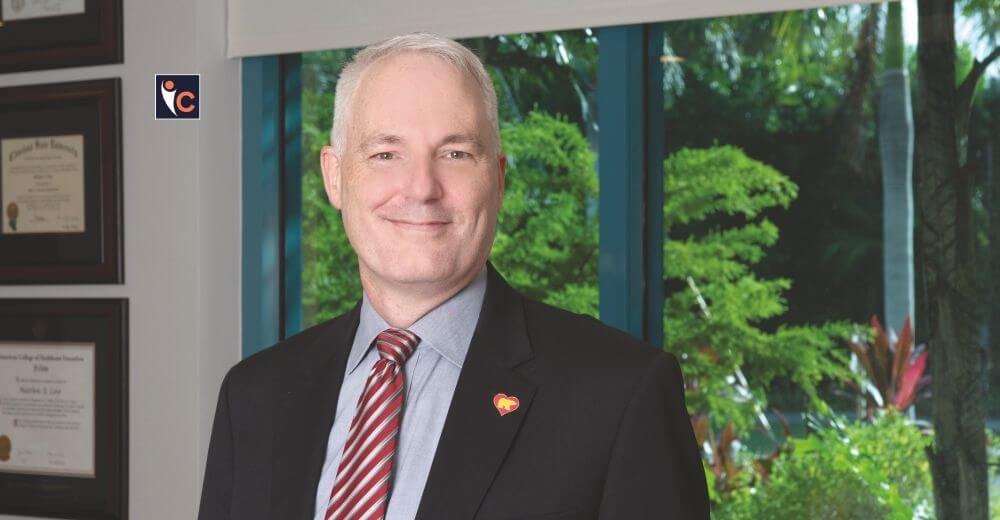In today’s digital age, the healthcare industry is undergoing a monumental transformation. Data analytics, once a supplementary tool, has emerged as a central pillar in redefining how healthcare institutions operate, make decisions, and ultimately, deliver patient care. The ability to utilize vast amounts of data to drive insights, predict outcomes, and tailor treatments has become a unique selling proposition (USP) for leading healthcare organizations.
At the forefront of this revolution is Sandeep Rustagi, Chief Data Analytics Officer at the University of Mississippi Medical Center (UMMC). Rustagi’s visionary leadership in integrating advanced technologies such as artificial intelligence (AI) and machine learning (ML) into healthcare data analytics is not just enhancing patient outcomes but also improving operational efficiency and reducing costs. His efforts are making healthcare more proactive, personalized, and precise, creating a paradigm shift from traditional, reactive models to innovative, predictive, and preventative frameworks.
Under Rustagi’s guidance, UMMC is leveraging data in unprecedented ways to revolutionize patient care and improve performance metrics, setting a new standard in the healthcare industry.
Let’s dive into the narrative of Sandeep Rustagi, a forward-thinking leader whose journey in data analytics is reshaping healthcare at UMMC!
A Journey Rooted in Data
Sandeep Rustagi’s professional journey is a document on the transformative power of data analytics. His path to becoming the Chief Data Analytics Officer at UMMC is paved with diverse experiences across global organizations, where he refined his skills in strategic transformation and data management.
“Working at a diverse set of organizations, I spearheaded numerous transformation initiatives, gaining deep insights along the way into key success factors,” recalls Rustagi. This extensive background laid the foundation for his current role, where he combines his expertise with a passion for healthcare to drive significant changes at UMMC.
Rustagi’s career began in the consulting industry, where he gained valuable experience in data management and analytics. His early roles involved working with large and complex organizations, developing analytical models and implementing data-driven solutions to improve business outcomes. Throughout his career, he has worked with a diverse range of clients, including healthcare organizations. This exposure to various industries and data challenges helped him develop a comprehensive understanding of data analytics and its potential applications in different sectors. His academic background with a Ph.D. and an M.B.A, has provided him with a robust foundation of analytical and managerial capabilities.
A Passion for Healthcare
Rustagi’s transition from a consultant to a key player in healthcare was driven by a profound desire to make a lasting impact. “Even as a consultant, I worked closely with healthcare providers and payers, gaining deep insights into their processes and technologies,” he explains. This experience illuminated the immense potential of data analytics in healthcare, inspiring Rustagi to take on a more permanent and impactful role at UMMC.
“Serving the local population and contributing to the community’s well-being was a significant motivator for me,” he adds. His move to UMMC was fueled by a desire to utilize his skills in data analytics to improve patient outcomes and operational efficiency in a healthcare setting. The opportunity to work at a leading medical center with a strong commitment to patient care and innovation further solidified his decision.
Leading with Data
At UMMC, Rustagi’s responsibilities are vast and multifaceted. UMMC is the state’s only academic medical center with six hospitals, over 10,000 employees and an extensive focus on research and education missions. “Our goal is to leverage data to enhance patient outcomes and streamline our operations,” he says. He emphasizes the importance of having a strong data governance framework and a skilled analytics team to drive these initiatives. Rustagi’s role involves overseeing data management, developing analytical models, implementing data-driven solutions, and ensuring data quality and integrity. Rustagi also highlights the importance of teamwork and collaboration. “Our executive leaders provide outstanding support, and we have a remarkably proficient team that identifies data needs, sets priorities and develop strategies to achieve UMMC’s goals,” he shares.
Key Initiatives in Transforming Healthcare with Data
Since taking on his role at UMMC, Rustagi has worked on several groundbreaking projects. One notable initiative is the development of AI-enabled smart hospital rooms. These rooms are equipped with audio-video technology that monitors patients and predicts risks such as falls or pressure ulcers.
“This technology not only enhances patient safety but also optimizes our operational excellence,” notes Rustagi. The smart hospital rooms utilize advanced AI algorithms to analyze real-time data from sensors and cameras, providing actionable insights to healthcare providers. This allows for proactive interventions, reducing the risk of adverse events and improving patient outcomes.
Another significant project involves using generative AI and large language models to create content for patient interactions. This initiative enables AI-assisted patient communications, improving productivity and reducing staff burn-out.
A Strategic Approach Aligned with UMMC’s Mission
Ensuring that data-driven insights align with UMMC’s broader mission is a critical aspect of Rustagi’s role. This involves close collaboration with executive and operational leaders to identify high-priority areas where data analytics can make the most impact.
“We prioritize initiatives based on input from our leaders, the availability of project champions, and the readiness of our teams for change,” he explains. This strategic approach ensures that the data analytics initiatives are not only impactful but also sustainable. Rustagi and his team work closely with various departments to understand their needs, identify pain points, and develop tailored solutions that align with UMMC’s strategic goals.
The Role of AI and ML
Rustagi envisions advanced data science capabilities such as AI and ML playing an integral role in the future of healthcare delivery at UMMC. “AI and ML are game changers in clinical decision-making, operations, and financial management,” he asserts.
From predicting patient readmissions to optimizing bed capacity, these technologies are set to revolutionize healthcare. Rustagi is particularly excited about integrating AI into population health management, using data to tailor treatments and improve health outcomes for diverse population groups. AI and ML can analyze vast amounts of data to identify patterns, predict trends, and provide personalized recommendations, leading to more effective and efficient healthcare delivery.
Navigating Data Challenges for Success
Implementing data analytics initiatives in healthcare comes with its own set of challenges. Rustagi identifies data quality, infrastructure, and financial investments as key hurdles. “Ensuring our data is accurate and reliable is paramount,” he states.
Data quality issues can arise from various sources, such as inconsistent processes, incomplete or inaccurate data, or fuzzy data standards. To address these challenges, Rustagi and his team are implementing robust data governance frameworks and quality control measures. They also work closely with IT and other departments to ensure that data infrastructure is scalable, secure and capable of supporting advanced analytics.
Additionally, the adoption of new technologies requires significant financial investments and a robust change management strategy. Rustagi emphasizes the importance of having a dedicated team of skilled professionals to navigate these challenges and drive successful implementations. He also highlights the need for continuous training and development to ensure that staff are equipped with the necessary skills and knowledge to leverage new technologies effectively.
Rewarding Moments with Impactful Outcomes
For Rustagi, the most rewarding aspect of his role is seeing the tangible impact of data analytics on patient care and productivity gains. He recalls a particularly impactful moment of establishing an AI-based ED forecasting model to align with bed capacity management across the hospital network. “This initiative lays the foundation for not only significantly improving patient care, but also enhancing overall hospital network efficacy,” he shares. Such successes underscore the transformative potential of data analytics in healthcare.
Staying Ahead Through Continuous Learning and Adaptation
In the fast-paced field of data analytics, staying updated with the latest trends and developments is crucial. Rustagi is committed to continuous learning and adaptation, regularly engaging with industry experts and participating in professional forums. “Keeping abreast of new technologies and best practices is essential to maintaining our competitive edge,” he asserts.
This proactive approach ensures that UMMC remains at the forefront of healthcare innovation. Rustagi and his team regularly attend conferences, participate in webinars, and engage with industry thought leaders to stay informed about emerging trends and technologies. They also invest in ongoing training and development programs to ensure that their skills and knowledge remain current.
Exciting Prospects on the Horizon
Looking ahead, Rustagi is particularly excited about several future initiatives and strategic goals at UMMC. One such initiative involves integrating AI into emergency department (ED) operations to optimize bed availability and improve patient flow.
“This will significantly enhance our ability to provide timely care to patients,” he notes. The AI-based system will analyze real-time data from various sources, such as patient records, staffing levels, and bed occupancy, to provide actionable insights for managing patient flow and optimizing resource allocation. This will help reduce wait times, improve patient outcomes, and enhance overall efficiency in the ED.
Additionally, Rustagi is exploring the potential of predictive analytics to identify high-risk patients and tailor interventions accordingly. Predictive analytics can analyze historical and real-time data to identify patterns and trends, enabling healthcare providers to proactively address potential issues before they escalate. This can lead to more personalized and effective care, improved patient outcomes and reduced healthcare costs.
These initiatives promise to further elevate the quality of care at UMMC. By leveraging advanced analytics and AI technologies, Rustagi and his team are paving the way for a future where data-driven insights drive continuous improvement and innovation in healthcare delivery.
Advice for Aspiring Professionals
For aspiring data analytics professionals interested in healthcare, Rustagi offers valuable advice. “Develop a deep understanding of healthcare processes and technologies,” he advises. He also emphasizes the importance of gaining diverse experience through a variety of roles, which can provide valuable insights into different organizational functions.
“Stay curious, continuously learn, and be adaptable,” he adds, highlighting the dynamic nature of the field. Rustagi encourages aspiring professionals to seek out opportunities to work on diverse projects, gain hands-on experience with different tools and technologies, and continuously expand their knowledge and skills. He also emphasizes the importance of building strong analytical and problem-solving skills, as well as developing a solid understanding of data governance and quality management.
Vision for the Future of Data Analytics in Healthcare
Rustagi envisions a future where data analytics plays an even more integral role in healthcare. “Data will drive more personalized and effective treatments, improve financial and operational metrics and enhance patient outcomes,” he predicts.
At UMMC, the focus will be on integrating advanced analytics into all aspects of healthcare delivery, from clinical decision-making to financial management. He also visualizes a future where data analytics and AI technologies are seamlessly integrated into everyday healthcare practices, enabling real-time decision-making and continuous improvement.
“The opportunities for leveraging data to transform healthcare are endless,” he concludes, reflecting a vision of continuous innovation and improvement. Rustagi’s vision is not only about leveraging data for immediate gains but also about building a sustainable, data-driven culture that continuously evolves and adapts to new challenges and opportunities.










